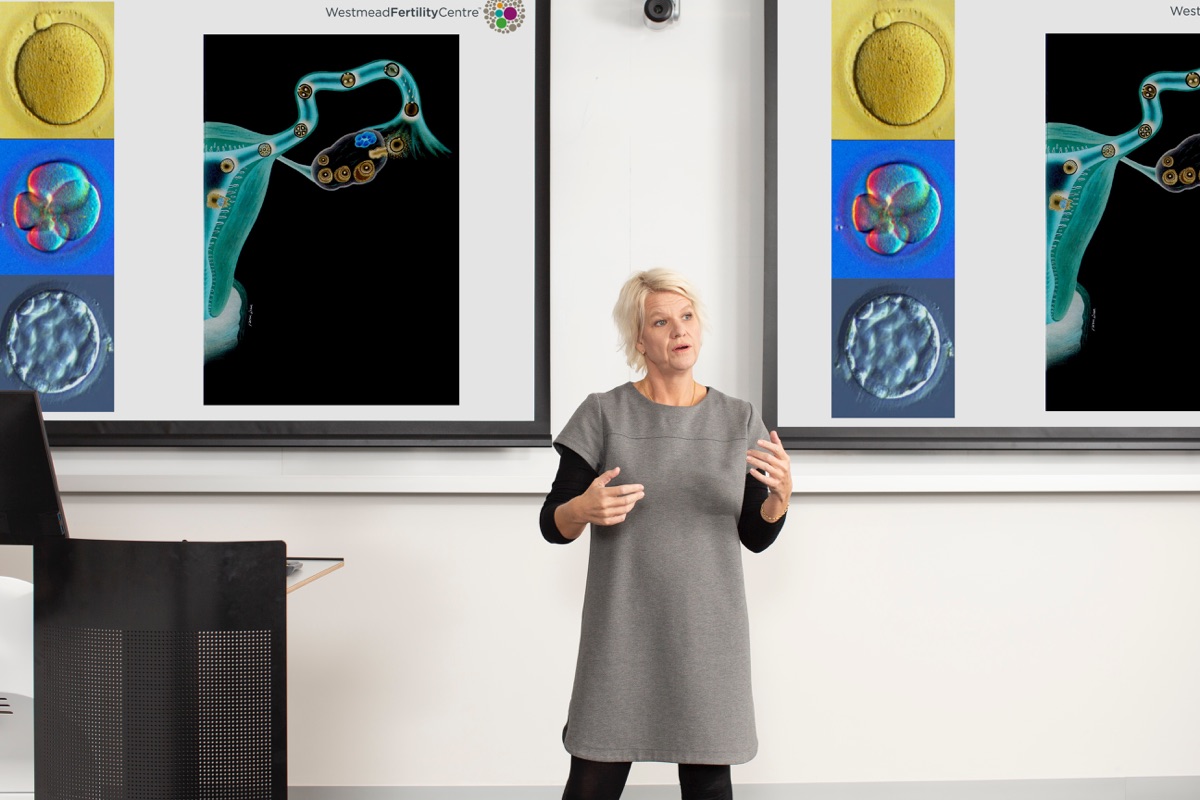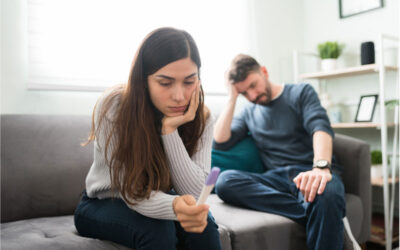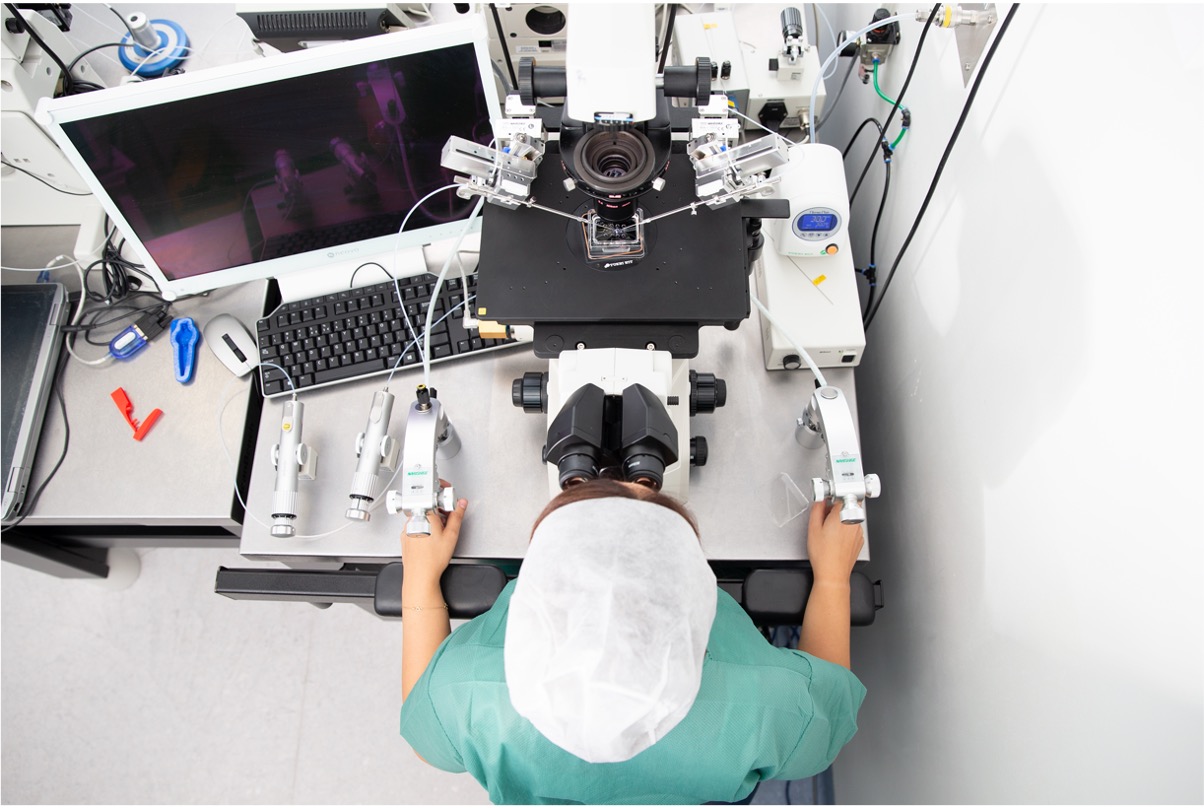Fertility peaks and then decreases over time in both men and women. Unfortunately, this means that as men and women age, both the sperm and the oocytes (or eggs) are less able to form an embryo that can implant and form a chromosomally normal baby.
Men can continue to produce sperm throughout their lives. As men age though, testosterone levels begin to decrease, semen volume and motility decline, and morphology can become increasingly abnormal. While age does not affect men as rapidly as it does women, it can increase the time to pregnancy.
But, when it comes to fertility, female age is a critically important factor.
A woman is born with all of the female gametes (called oocytes) she will ever have. At birth the ovaries contain approximately 2 million oocytes and by the time of the first menstruation (or period), this number will have dropped to approximately 300,000. Most of those oocytes go through a process of loss and never even make it to ovulation.
Age as a number
Female fertility is estimated to be optimal at about age 22 and gradually declines from then on. By age 33 this decline becomes more rapid and even more so after 35 years of age. By the time a female reaches 36 years of age, the chance of conceiving in any month will have dropped by half. The decline continues until age 45 where the natural fertility rate per month drops to approximately one per cent (1%). After menopause women are no longer able to become pregnant naturally or without the use of donor oocytes.
Normal success rates
You should also take into consideration that even a young, healthy woman trying to get pregnant has only about a 25% chance of success each month. Not every oocyte leads to a baby, no matter how young you are. And unfortunately, no matter how healthy you are, it does not offset the natural age-related decline in fertility.
Celebrity pregnancies
Stories in the news about celebrity pregnancies falsely allow people to believe that they will be able to use fertility treatments to get pregnant no matter what their age. The truth is, conceiving naturally with your own oocytes over the age of 45 is highly unlikely. Some celebrities are breaking the silence and opening up about their fertility struggles as they age, but many still like to create an unrealistic illusion.
Abnormalities associated with age
As women age, there is a much greater risk of genetic abnormalities called aneuploidy (too many or too few chromosomes in the oocyte). A normal oocyte and sperm carry 23 chromosomes each. If an embryo has too few or too many chromosomes it may not result in a pregnancy, or will more than likely result in miscarriage. In 20 to 25 year old women, the risk of chromosomal abnormality is 1/500. At age 45, this increases to approximately 1/20. This explains the lower chance of pregnancy and the increased chance of miscarriage in older women.
At this point, egg donation using donor oocytes from a younger woman is the most successful way to conceive a healthy baby. In the case of above-mentioned celebrities, it is likely the only alternative.
Other reasons why age impacts fertility in females include:
- As females age, their oocytes contain fewer and fewer healthy mitochondria. Mitochondria come from the oocyte and hold energy required for an embryo to keep dividing and growing. If there is not enough energy to reach the point where the developing embryo can make its own mitochondria, development cannot continue, resulting in failure to fertilise or divide or implant or flourish.
- The menstrual cycle may become less regular, with periods absent or irregular, ovulation is often absent or irregular too. An absence of ovulation will result in infertility.
- Conditions, such as Endometriosis and Fibroids can also increase with age.
Fertility preservation
No discussion on the impact of age on fertility would be complete without addressing fertility preservation. Thanks to advances in science it is possible for women to retrieve and store their oocytes for future use. Oocyte freezing for fertility preservation is proving to be quite successful, but it must be advised this is not a 100% guarantee. Success rates also depend on the quality and age of the oocytes at the time of preservation.
Fertility tests
A routine diagnostic work-up will be required to get an understanding of your fertility. Tests may include measuring your follicle stimulating hormone (FSH) and Anti-Müllerian hormone (AMH) levels, as well as an ultrasound to assess your antral follicle count.
When to seek assistance
Our recommendations are to seek help if you are under 35 and have been trying for 12 months or more with without success. If you are over 35 and have been trying for six months without success, we encourage you to speak with your GP or a fertility specialist as soon as possible. If at any age you are concerned about your fertility potential, make an appointment with a Westmead Fertility Centre fertility specialist to discuss.
At Westmead Fertility Centre we will make sure that you are well advised of the likelihood of success for your individual circumstances.
“Age is no barrier to achieving many things. But it can reduce the chance of a woman getting pregnant and having a healthy baby. A woman’s age is the single most important factor affecting her fertility” (see https://www.yourfertility.org.au/sites/default/files/2018-11/Age_and_reproductive_outcomes.pdf for more information)
All content should be considered as opinion only. Always seek the direct advice of your doctor in connection with any questions or issues you may have.




